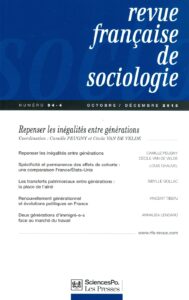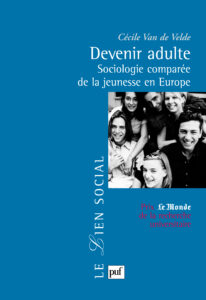Books and Special Issues
 VAN DE VELDE Cécile, PERRIARD Anne (Eds), « Emotions et politique » (Emotions and Politics), Lien social et politiques, n. 86, 2021, 224 p. Download the introduction : « Le pouvoir politique des émotions »
VAN DE VELDE Cécile, PERRIARD Anne (Eds), « Emotions et politique » (Emotions and Politics), Lien social et politiques, n. 86, 2021, 224 p. Download the introduction : « Le pouvoir politique des émotions »
What is the political power of emotions? This issue of Lien social et Politiques opens up an interdisciplinary research front on the links between emotions and politics. The 13 articles in this issue show how these emotions, long ignored by the social sciences, can today be approached in a diversity of emotional languages – bodily, oral or written – and empirical devices, whether within political debates, social media exchanges, public speaking or in-depth life stories. We emphasize that the study of the political power of emotions cannot be reduced to the analysis of political and partisan discourses alone, as this power is also played out in intimate, social and public spheres.
Quel est le pouvoir politique des émotions ? Ce numéro de Lien social et Politiques ouvre un front de recherche interdisciplinaire sur les liens entre émotions et politique. Les 13 articles de ce numéro montrent comment ces émotions, longtemps ignorées par les sciences sociales, peuvent aujourd’hui être approchées dans une diversité de langages émotionnels – corporels, oraux ou écrits – et de dispositifs empiriques, que ce soit au sein de débats politiques, d’échanges sur les médias sociaux, de prises de parole publiques ou de récits de vie approfondis. Nous soulignons que l’étude du pouvoir politique des émotions ne peut se réduire à la seule analyse des discours politiques et partisans, car ce pouvoir se joue également dans les sphères intimes, sociales et publiques.
 VAN DE VELDE Cécile (ed.), « Solitudes contemporaines » (Contemporary Loneliness), Sociologie et Société, vol. 1, n.1, 272 p., 2018.
VAN DE VELDE Cécile (ed.), « Solitudes contemporaines » (Contemporary Loneliness), Sociologie et Société, vol. 1, n.1, 272 p., 2018.
Is a sociology of solitude possible? This issue aims to help break down barriers and structure a sociology of solitude: from the most radical to the most ordinary solitudes, the articles gathered aim to explore solitude where we don’t always expect it, whether at different ages of life (young people, parental leave, the elderly), with contrasting social groups (marginalized populations, adults with mental health problems), or in different spheres of life (daily, family, social), and in different activities (reading, eating). The aim of this dialogue is to desegment the field and invest new angles of approach.
Une sociologie de la solitude est-elle possible ? Ce numéro entend contribuer au décloisonnement et à la structuration d’une sociologie de la solitude : des solitudes les plus radicales aux solitudes les plus ordinaires, les articles rassemblés visent à explorer la solitude là où on ne l’attend pas toujours, que ce soit à différents âges de la vie (jeunes, congé parental, personnes âgées), avec des groupes sociaux contrastés (populations marginalisées, adultes ayant des problèmes de santé mentale), ou dans différentes sphères de la vie (quotidienne, familiale, sociale), et dans différentes activités (lire, manger). L’objectif de ce dialogue est de désegmenter le champ et d’investir de nouveaux angles d’approche.
 GIRET Jean-François, VAN DE VELDE Cécile, VERLEY Elise (eds), Les vies étudiantes. Tendances et inégalités (Student lives. Trends and inequalities), Paris, La Documentation Française, 312 p., 2016.
GIRET Jean-François, VAN DE VELDE Cécile, VERLEY Elise (eds), Les vies étudiantes. Tendances et inégalités (Student lives. Trends and inequalities), Paris, La Documentation Française, 312 p., 2016.
This book looks at student life in France in the second decade of the 21st century. Based on the triennial « Conditions de vie des étudiants » survey (41,000 students constituting a representative sample of the student population in France) conducted in 2013 and 2014, it sheds precise light on student living conditions, and provides input for future debates on higher education in France and elsewhere in the world. This book analyzes not one, but several student lives: it identifies trends and inequalities in terms of resources, articulation of life and study times, relationship to the future, but also experienced and perceived vulnerabilities.
Cet ouvrage s’intéresse à la condition étudiante en France dans la deuxième décennie du XXIe siècle. A partir de l’enquête triennale « Conditions de vie des étudiants » (41 000 étudiants constituant un échantillon représentatif de la population étudiante en France) menée en 2013 et 2014, il apporte un éclairage précis sur les conditions de vie étudiantes, et permet de nourrir les débats à venir sur l’enseignement supérieur en France et ailleurs dans le monde. Cet ouvrage analyse non pas une, mais plusieurs vies étudiantes : il identifie les tendances et les inégalités en termes de ressources, d’articulation des temps de vie et d’études, de rapport à l’avenir, mais aussi de vulnérabilités vécues et perçues.
 VAN DE VELDE,Cécile, Sociologie des âges de la vie (Sociology of the Ages of Life), Collection 128, Dunod, 128 p., 2015.
VAN DE VELDE,Cécile, Sociologie des âges de la vie (Sociology of the Ages of Life), Collection 128, Dunod, 128 p., 2015.
From childhood to old age, how are the different stages of life articulated today? What does it mean to be « young » or « old » in contemporary society? This book offers an up-to-date cartography of the sociology of the ages of life, through its tools, contributions and perspectives. Its development is based on a scientific principle: to break with a compartmentalized conception of ages, in order to allow us to read, from birth to death, the challenges and metamorphoses of contemporary life courses. It compares the main sociological approaches to life – the « age » prism, the « trajectory » prism, the « generation » prism – and shows how they are now challenged by the increasingly blurred and complex boundaries between education, work and retirement. Opening up to international comparison, he analyzes how different social models structure the development of ages and the coexistence of generations.
De l’enfance à la vieillesse, comment s’articulent aujourd’hui les différents temps de la vie ? Que signifie être « jeune » ou « vieux » dans nos sociétés contemporaines ? Cet ouvrage propose une cartographie actualisée de la sociologie des âges de la vie, à travers ses outils, ses apports et ses perspectives. Son élaboration repose sur un principe scientifique : rompre avec une conception cloisonnée des âges, pour donner à lire, de la naissance à la mort, les enjeux et les métamorphoses des parcours de vie contemporains. Il compare les principales approches sociologiques des existences – le prisme des « âges », le prisme des « parcours », le prisme des « générations » – et montre comment elles sont désormais remises en cause par des frontières de plus en plus floues et complexes entre éducation, travail et retraite. En s’ouvrant à la comparaison internationale, il analyse comment les différents modèles sociaux structurent le développement des âges et la coexistence des générations.
 PEUGNY Camille, VAN DE VELDE Cécile (des), « Repenser les inégalités entre générations » (Rethinking Intergenerational Inequalities), Revue Française de Sociologie, vol. 54, n.4, 2013.
PEUGNY Camille, VAN DE VELDE Cécile (des), « Repenser les inégalités entre générations » (Rethinking Intergenerational Inequalities), Revue Française de Sociologie, vol. 54, n.4, 2013.
At a time when the theme of intergenerational inequalities is occupying a growing place in international sociological literature, this special issue of the Revue Française de Sociologie takes stock of the stakes and scope of analysis in terms of intergenerational inequalities. While underlining the importance of what has been learned from this work, it also calls for the opening up of new avenues of research: thinking about the articulation between several generations to move beyond the opposition between two generations; thinking together about intergenerational and intragenerational inequalities; articulating social inequalities and family solidarity between generations; raising the question of a possible awareness of the generation and its political manifestations.
Alors que le thème des inégalités intergénérationnelles occupe alors une place croissante dans la littérature sociologique internationale, ce numéro spécial de la Revue Française de Sociologie fait le point sur les enjeux et la portée de l’analyse en termes d’inégalités intergénérationnelles. Tout en soulignant l’importance des acquis de ces travaux, il appelle à l’ouverture de nouveaux fronts de recherche : penser l’articulation entre plusieurs générations pour sortir de l’opposition entre deux générations ; penser ensemble les inégalités intergénérationnelles et intragénérationnelles ; articuler inégalités sociales et solidarités familiales entre générations ; poser la question d’une possible prise de conscience de la génération et de ses manifestations politiques.
 BECQUET Valérie, LONCLE Patricia, VAN DE VELDE Cécile (eds), Politiques de jeunesse : le grand malentendu (Youth Policies : the big misunderstanding), Edition Champs social, 2012.
BECQUET Valérie, LONCLE Patricia, VAN DE VELDE Cécile (eds), Politiques de jeunesse : le grand malentendu (Youth Policies : the big misunderstanding), Edition Champs social, 2012.
Become « autonomous », « inserted » and « citizen »: this book deciphers, through the three main words that structure them, the relationship between public policy and youth in French society. Indeed, these notions of autonomy, integration and citizenship now structure youth policies, as much as they polarize public and media debate on the younger generation. The aim of this book is to deconstruct these buzzwords, analyze their ideological underpinnings, and follow these policies as they move into practice. Through these three concepts, this book invites us to measure their effects and their possible inadequacy with the social needs they are supposed to meet.
Deviens « autonome », « inséré » et « citoyen » : cet ouvrage décrypte, à travers les trois mots principaux qui les structurent, les relations entre les politiques publiques et la jeunesse au sein de la société française. En effet, ces notions d’autonomie, d’insertion et de citoyenneté structurent aujourd’hui les politiques de jeunesse, autant qu’elles polarisent les débats publics et médiatiques sur les jeunes générations. L’ouvrage se propose de déconstruire ces mots-écrans, d’en analyser les fondements idéologiques et de suivre ces politiques dans leur cheminement vers les pratiques. À travers ces trois concepts, cet ouvrage nous invite à mesurer leurs effets et leur éventuelle inadéquation avec les besoins sociaux auxquels ils sont censés répondre.
 VAN DE VELDE Cécile, Devenir adulte. Sociologie comparée de la jeunesse en Europe (Becoming an Adult. Comparative Sociology of Youth in Europe), Presses Universitaires de France, 2008.
VAN DE VELDE Cécile, Devenir adulte. Sociologie comparée de la jeunesse en Europe (Becoming an Adult. Comparative Sociology of Youth in Europe), Presses Universitaires de France, 2008.
By comparing the family and career paths of young adults in Denmark, the UK, France and Spain, this book maps the passage to adulthood in Western Europe and analyzes its main political, economic and cultural foundations. It is based on extensive survey material combining statistical analyses from the first six waves of the European Household Panel (1993-1999), supplemented by over 135 semi-structured interviews with individuals aged 18 to 30 in the 4 countries concerned. By questioning the role of public policies and social norms on life experiences, this book has contributed to the understanding of social contrasts in « coming of age » in Western Europe. It was awarded the Le Monde prize for academic research.
En comparant les parcours familiaux et professionnels de jeunes adultes au Danemark, au Royaume-Uni, en France et en Espagne, cet ouvrage dresse une cartographie du passage à l’âge adulte en Europe occidentale et en analyse les principaux fondements politiques, économiques et culturels. Il s’appuie sur un vaste matériau d’enquête combinant analyses statistiques issues des six premières vagues du Panel européen des ménages (1993-1999), et complété par plus de 135 entretiens semi-directifs menés auprès d’individus âgés de 18 à 30 ans dans les 4 pays concernés. En interrogeant le rôle des politiques publiques et des normes sociales sur les expériences de vie, cet ouvrage a contribué à la compréhension des contrastes sociaux dans le » devenir adulte » en Europe occidentale. Il a reçu le prix Le Monde de la recherche universitaire.